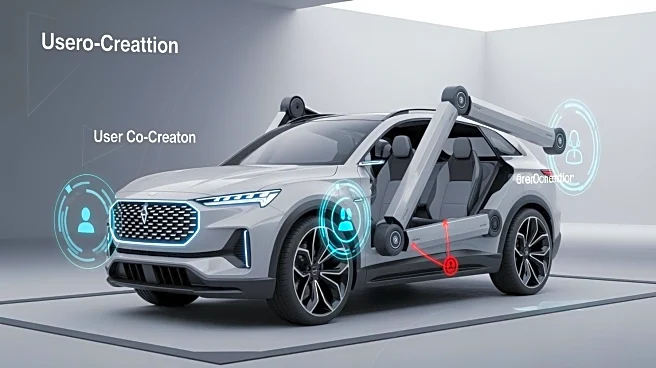What's Happening?
Chery has introduced a new seven-seat transformable SUV concept vehicle at the 2025 Chery Brand Night event. This innovative vehicle is designed to offer multiple configurations, allowing it to transform between
passenger and cargo modes. The concept, described as 'one vehicle, multiple configurations,' includes features such as a quick-release structure for easy transformation, a 600-litre cargo space, and various interior and exterior layouts. Chery conducted extensive user research across several countries, including Indonesia, Mexico, and Thailand, to identify common family-use scenarios that existing vehicles do not fully address. The company plans to involve users worldwide in the co-creation process before mass production, focusing on feature design, powertrain tuning, model naming, and ecosystem customization.
Why It's Important?
The introduction of Chery's transformable SUV concept vehicle represents a significant shift in automotive design, emphasizing user-centric innovation and adaptability. By involving users in the co-creation process, Chery aims to tailor the vehicle to meet diverse consumer needs, potentially setting a new standard in the automotive industry. This approach could influence other manufacturers to adopt similar strategies, fostering greater consumer engagement and satisfaction. The vehicle's versatility in addressing various family-use scenarios could appeal to a broad market segment, enhancing Chery's competitive edge globally. Additionally, the focus on customization and adaptability may drive advancements in automotive technology and design.
What's Next?
Chery plans to release the transformable SUV to consumers by the third quarter of 2026. The company will continue to develop additional transformable modes and official accessory kits to expand the vehicle's functional capabilities. As the co-creation process unfolds, Chery will gather further insights from users to refine the vehicle's design and features. This collaborative approach may lead to innovative solutions and enhancements that align closely with consumer preferences. The success of this initiative could prompt other automakers to explore similar user-driven design processes, potentially reshaping industry standards and consumer expectations.
Beyond the Headlines
The concept of user co-creation in vehicle design introduces ethical considerations regarding consumer data usage and privacy. As Chery collects user insights to inform design decisions, it must ensure transparent and secure handling of personal information. This development also highlights a cultural shift towards greater consumer empowerment in product development, reflecting broader trends in personalization and customization across industries. Long-term, this approach could lead to more sustainable and efficient manufacturing processes, as vehicles are designed to meet specific user needs, reducing waste and enhancing resource utilization.










